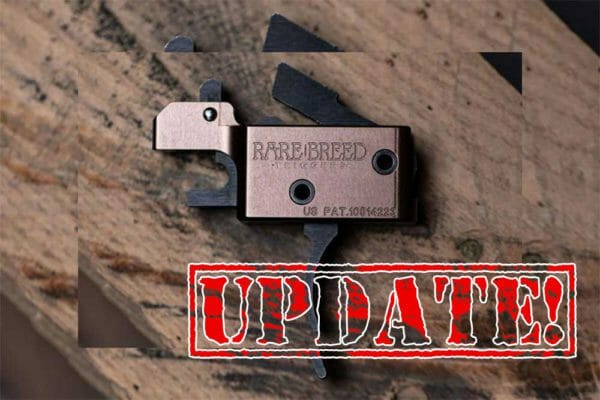-
ATF’s Injunction Win: The ATF secured an injunction in Brooklyn, preventing Rare Breed Triggers from selling certain triggers & preserving customer records.
-
Legal Dispute on Trigger Function: The FRT-15 trigger is at the heart of the controversy, with Rare Breed asserting its legality while the ATF deems it a machinegun conversion.
-
Jurisdiction & Patent Controversy: Both Rare Breed & the ATF face claims of “judge-shopping.” The ATF suggests the FRT-15 is a repurposed, previously outlawed device, a claim disputed by Rare Breed.

The Bureau of Alcohol, Tobacco, Firearms and Explosives (ATF) has won a preliminary injunction in a Brooklyn District court barring Rare Breed Triggers, LLC from selling any forced reset triggers and from destroying customer records. This decision comes six days after Rare Breed Triggers, with the help of the National Association for Gun Rights (NAGR), won a temporary restraining order barring the ATF from taking enforcement actions against the individual named plaintiffs in a district-level federal case in Texas.
Federal Judge Nina R. Morrison has issued a preliminary injunction in favor of the ATF in United States v. Rare Breed Triggers, LLC. The judge ruled that the federal government was likely to succeed on the merits of the case, claiming that the parties most likely engaged in a Klein conspiracy. A Klein conspiracy is a somewhat murky charge where the defendants enter into a conspiracy to “impair or impede” lawful functions of the federal government.
The multiple-year legal battle has centered around the company’s forced reset triggers, the FRT-15.
Rare Breed Triggers claim the FRT-15 is a drop-in semi-automatic trigger that increases the rate of fire of an AR-15-style firearm by forcing the trigger to reset. Rare Breed points out that a gun equipped with its trigger will only expel one round per trigger pull.
The ATF believes that the FRT-15 and the Wide Open Trigger, which Rare Breed also sold for a limited time, are drop-in auto sears (DIAS) enabling the shooter to expel multiple rounds with a “single function of the trigger.” Any machinegun conversion device is regulated under the National Firearms Act of 1934 (NFA) as machineguns. Since no machineguns made after April 1986 can be added to the NFA registry, the ATF deduces that all FRT-15 and WOT forced reset triggers are illegal, thanks to the Hughes amendment.
The battle between the ATF and Rare Breed started in July of 2021 when the ATF served the company with a cease-and-desist order. The company ignored the letter and continued to sell the triggers through its website. The company would sue the ATF in the Middle District of Florida but failed to achieve a victory.
The company would try reincorporating in North Dakota and sue the ATF in District Court. The ATF claimed the company was “judge-shopping” and picked North Dakota for its conservative judges. The case would eventually be thrown out for lack of jurisdiction.
A few months later, the ATF would do precisely what it claimed Rare Breed was doing with its North Dakota case.
The ATF and the Department of Justice (DOJ) would sue Rare Breed Triggers, LLC., Rare Breed Firearms LLC., Kevin Maxwell, and Lawrence DeMonico in a Brooklyn, NY District Court, claiming the company was selling machinegun conversion devices and was trying to obfuscate the companies actions through a series of shell companies.
The ATF claimed it picked the anti-gun district because Rare Breed’s bank is in New York City.
The ATF also claimed that Rare Breed repurposed the patent for the AR-1 trigger into the FRT-15. The AR-1 was previously determined to be a machine gun by the ATF. Rare Breed denies this accusation, claiming that the FRT-15 differs from the AR-1 trigger. The judge in the case believed the ATF and wrote in her 129-page decision:
“One thing Defendants knew—but did not tell their customers—when they launched their FRT-15 sales campaign in 2020 was that its predecessor device, the AR-1, had been classified by the ATF as a machinegun. Certain aspects of the AR-1 were modified in its redesign. But the essential “forced-reset trigger” feature of the device, enabling automatic fire as long as the shooter maintains pressure on the trigger—which Defendants knew was the reason the ATF had classified it as an illegal machinegun—remained unchanged.”
The court has ordered Rare Breed Triggers to stop selling the FRT-15, WOT, or any other forced reset trigger. The company is also ordered to maintain all company records, including the sale and disposition of the company’s products.
*AmmoLand News reached out to Lawrence DeMonico for comment via text, but our request was not returned as of publishing.
Department of Justice Win Preliminary Injunction Against Rare Breed Triggers
Read Related:
- ATF Showing Up At People’s Doors Confiscating Rare Breed FRT-15 Triggers
- Rare Breed Triggers & Big Daddy Unlimited Settle Patent Infringement Case
- ATF Confiscating Wide Open Triggers from Gun Owners
About John Crump
John is a NRA instructor and a constitutional activist. John has written about firearms, interviewed people of all walks of life, and on the Constitution. John lives in Northern Virginia with his wife and sons and can be followed on Twitter at @crumpyss, or at www.crumpy.com.

